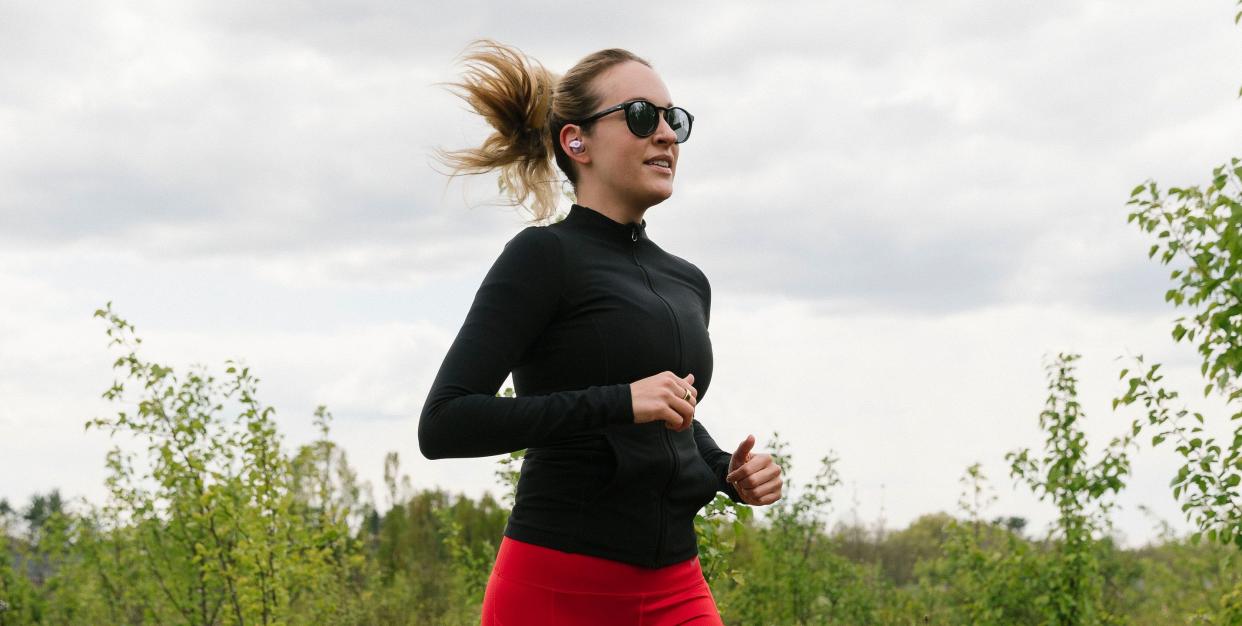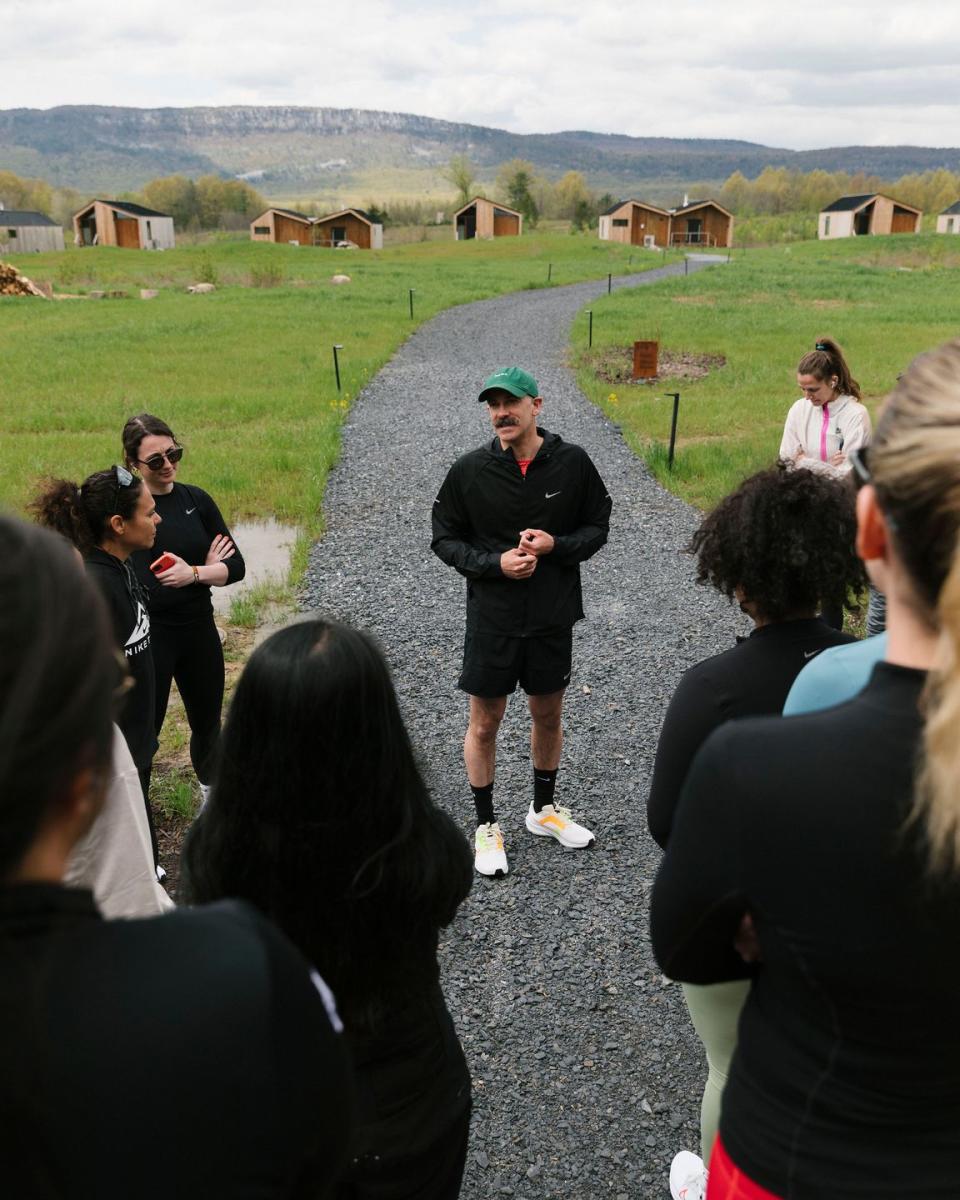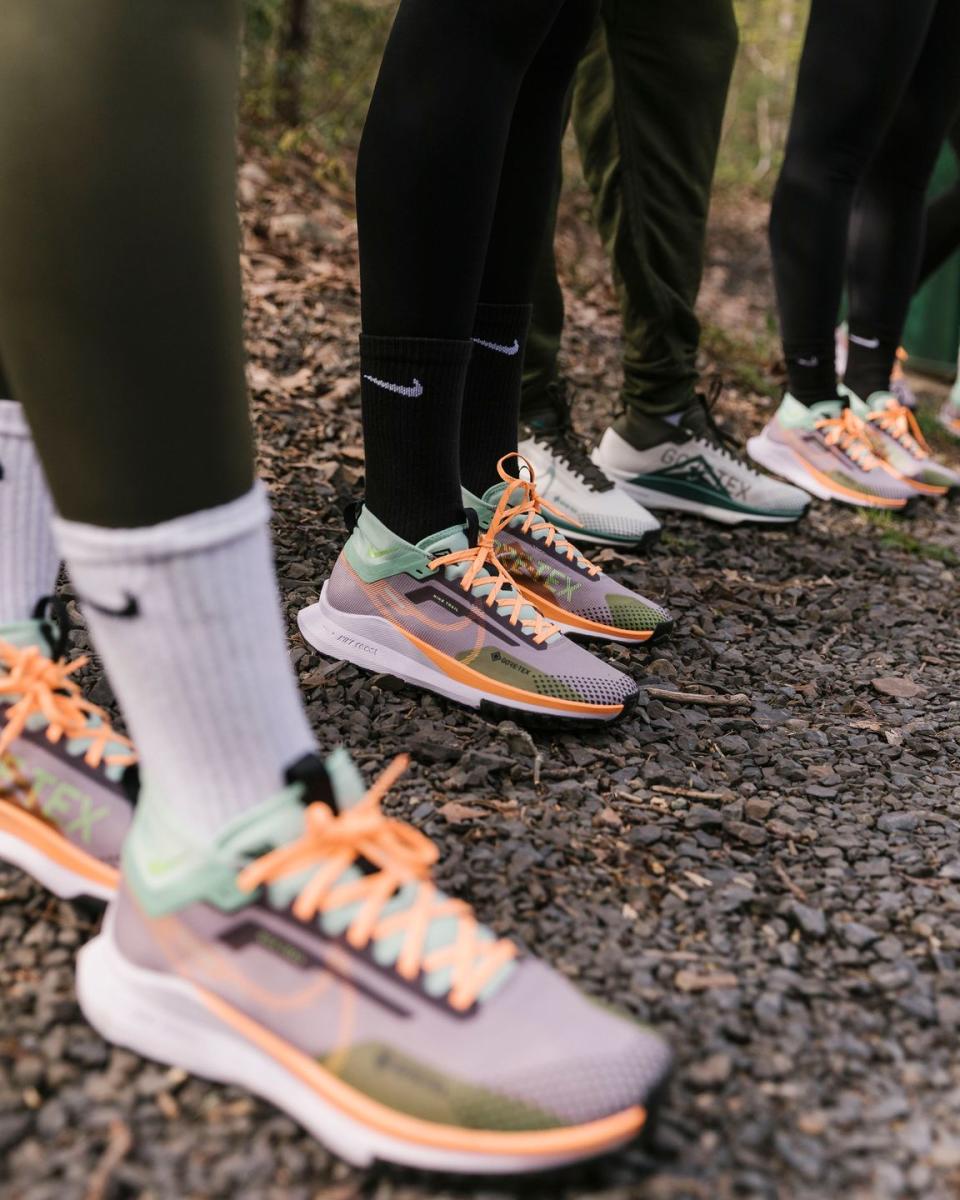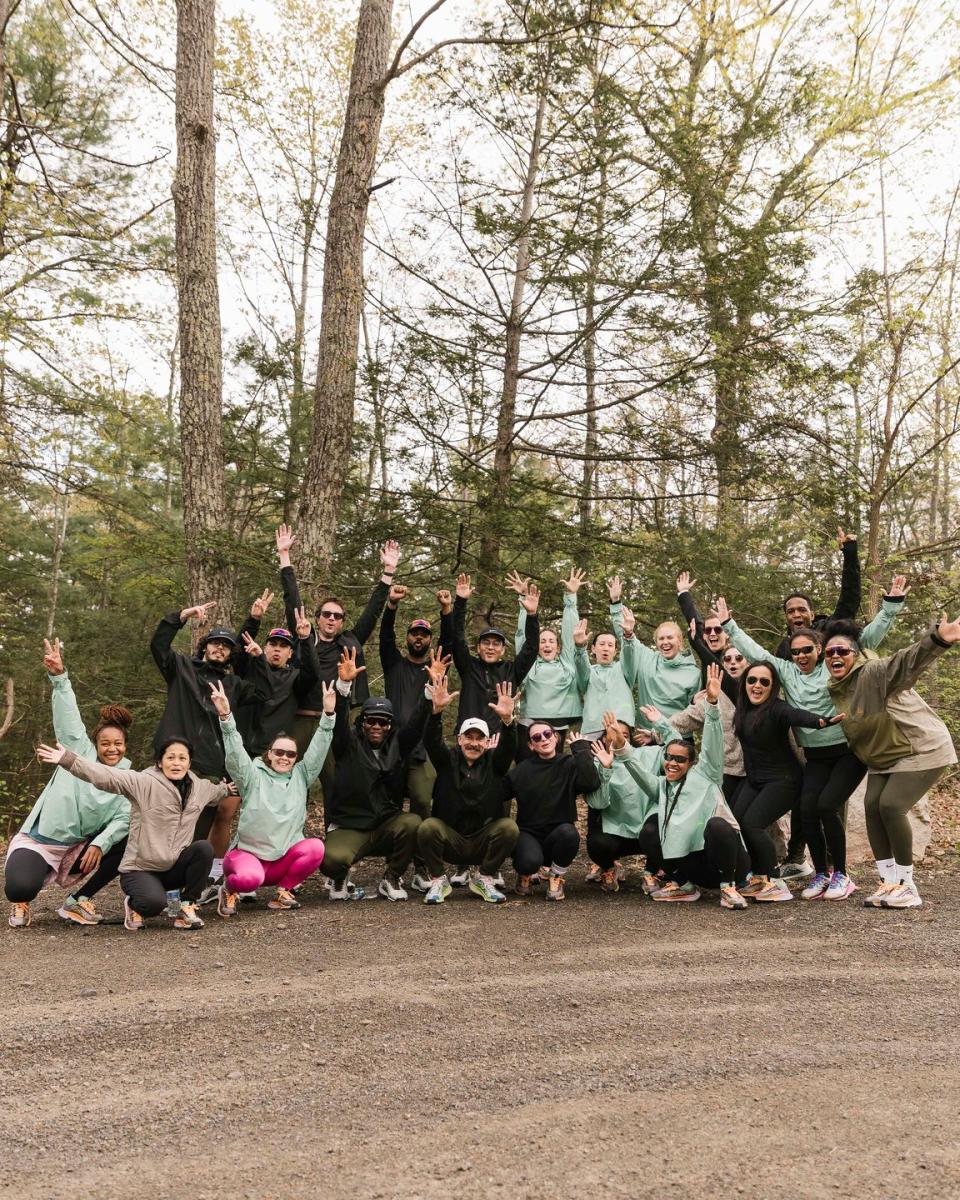Coaches Say This Bad Habit Is Keeping So Many Runners From Reaching Their Potential

"Hearst Magazines and Yahoo may earn commission or revenue on some items through these links."
On a bus ride to upstate New York back in April, I had somewhat of a running epiphany. A group of about 20 of us had the privilege of participating in a two-day running camp, hosted by Nike, where we got to explore our individual relationships with running, test our skills on dirt and gravel trails, cheer each other on during multiple group runs, and beyond. But the observation I couldn't stop thinking about happened during the icebreaker game on the way there.
Chris Bennett, a Nike running coach (who is pretty much a real-life Ted Lasso!), posed this prompt to each of us: “Share your name and a little about your relationship with running.”
Camp goers’ answers went something like this: “Well, I just did X half marathon but I’m definitely not, like, a real runner.” “I honestly am really bad at running and will probably be behind you guys on this trip, walking a lot.” “I am signed up for a race in a few months but I’m definitely not a runner runner like [insert another person or athlete’s name here].” And so on.
Nearly every single one of us—despite our various backgrounds as joggers, marathoners, walk-runners, 5K participants (all completely valid, wonderful running experiences, I might add)—still did not believe we were actually … runners.
Meet the experts: Chris Bennett is the senior director of Nike Global Running. Lennie Waite, PhD, is a performance psychology consultant and former Olympic athlete.
It hit me in that moment: Running is this unique challenge that causes more people than I ever realized to feel insecure, self-deprecating, and inadequate in their ability. I wondered, Why is that—and how do we change the narrative to get more joy out of the sport?
If you can relate (*raises hand*), keep reading for expert advice on how to improve your running self-talk, quit the comparison game, and infuse every single run with confidence and satisfaction.
Where Runner Imposter Syndrome Comes From
Experts agree that the comparison and self-doubt trap with running is all too common—and that it happens in running arguably “more than any other sport,” notes Bennett. “You never hear someone who plays pickup basketball say, ‘well, I'm not a real basketball player’ when you ask them about it.”
And, in fact, “When people introduce themselves to me, it's their name and that they suck at running,” Bennett adds. “It’s fascinating to me that [running] is one of the only things in life that people are negative about immediately—especially something they're doing that takes courage and effort.”
There are a few possible reasons for this. For one, most people have engaged in running in some shape or form in their lifetime. It's tough to stop comparing yourself when you notice how many people around you are doing that thing too. “It can feel like an added pressure when you see everyday exercisers around you doing what you think is an everyday activity faster or ‘better’ than you,” says Lennie Waite, PhD, a Houston-based sport and performance psychology consultant and former Olympic athlete.
What’s more: How running is portrayed in the media may cause you to feel that you must look a certain way or perform at a certain level to be considered a true runner. (Picture: Blake Lively’s character, with her long, beachy hair down in a sports bra and shorts, sprinting on the beach to impress her soccer coach in Sisterhood of the Traveling Pants; or Emily in Paris’ leading lady bopping through the streets of France in a matching workout set with a smile, and sans any sweat.) “How running is covered in the media is not exactly a realistic representation for 99 percent of the population,” Waite notes.
Not to mention, running historically has been fear-induced (like when you’re running from something) or used as a form of punishment (like being put through sprints after being late to practice) or as a measurement of health (when you had to run the mile in gym class). Those negative associations stick with you and can shape a negative view of yourself when you run as an adult.
How To Make Every Run A Great One
Now for the good stuff: Our pros have simple, actionable tips for how to quiet that shamey internal dialogue and approach runs as your best self. By applying the tricks here, you can shift your relationship with running to a healthier place and, in turn, stay consistent with your practice and reap the physical and mental benefits of the sport (there are oh-so many!).
“It's hard to be kind and support yourself on a run. But when you do, you'll end the run saying, ‘I would like to do that again,’ ” Bennett says. “No one wants to do something over and over again that ends with them feeling like a failure or less than what they were when they started.”
You. Are. A. Runner. Don’t forget it.

1. Consider the definition.
Yes, like the one in the Oxford English Dictionary. “I talk about words a lot—and if you look up the definition of running, it says ‘the activity of a runner,’ ” Bennett says. “So, by a simple definition, if you're running, you're technically a runner.”
There is also nothing in that definition to say that when you stop running, take a break, slow down, or bail on a race that you're no longer a runner, Bennett adds. A reassuring fact to come back to during miles of doubt!
2. ID your most confident self—then show up to runs as her.
When a new client approached Waite about how to get her head in the game to break 3:30 in her upcoming marathon, she felt silly for even approaching the sports psychologist since she “wasn’t a professional athlete,” recalls Waite. She reminded the client that if something is important to you (including a hobby or passion), it constitutes having help in the form of a mental health pro or coach.
From there, as an exercise, Waite took their focus off running entirely for a bit, and instead they spent a lot of time discussing other environments in which she felt like her most-confident, professional self.
“We talked a lot about her work environment as a very successful lawyer,” Waite says, asking her client to even describe how she enters the courtroom with self-assurance. “I then asked, 'what if you approached the start line of a race like that?' She laughed and asked, ‘why would I do that?’ ”
Waite flipped the scenario around: “What would happen if you entered the courthouse with your running self? She said, ‘oh, that would be horrible. I would lose,’ ” Waite shares.
You can apply this mental exercise too: Picture the most confident version of you, and where and how she shows up. Then, channel that energy each time you head out to run, even if it feels phony or awkward at first. When you’re stuck, remind yourself that you wouldn’t show up to, say, your job or relationship in the self-doubting way you do with running—so it’s time to flip the script and give running the same go-getter confidence that you bring to other endeavors that matter to you.

3. Practice mindfulness while you run.
When you run, you probably do a breathing check from time to time, or notice when you need a slug of water, or take note of where your foot is striking the pavement. Your mind deserves periodic check-ins too, Bennett says.
He incorporates mental TBs into the guided audio runs on the Nike Run Club app. “I call them system checks, where I talk about your breathing, your form—and then I might ask, ‘okay, now how’s the conversation in your head?’ ”
If you’re having trouble keeping yourself in the moment and catching where your mind drifts to, a guided audio run is a great tool.
4. Celebrate the act of running.
The decision to lace up is a powerful one. “As a person who runs, you're in the minority—more people don't run than do,” Bennett says. That choice is irregular and extraordinary, he adds.
“Most people don't move for a host of different reasons,” Bennett says. “Honor the simple fact that you're out there and moving, much less running.”
Instead of using a run as an opportunity to emotionally tear yourself apart, use it as an opportunity to say: “Wow, I've had a hard day, I've been tired or I'm frustrated, and I still showed up to run. I'm taking care of myself and I'm doing something positive.”
5. Be your own running buddy.
How would you hype up a friend after a race or cheer them on when they hit a wall on a jog? “Pretend your friend is saying [negative] stuff. What would you say to them?” Bennett says. “You’d probably say, ‘listen, you're out running on a Tuesday night after a long day of work. You're a badass. This is your third day running this week. You did a 10K two months ago. I was there, I saw you do that. How dare you say these things to yourself.'”
Next time you’re beating up your runner self, pause and acknowledge that negative voice, then be your own hype person. “A couple times in a run, have a checkpoint where you notice whether the jerk teammate is talking in your head,” Bennett says. There is always a positive cheerleader somewhere in your head and a terrible teammate, he points out, “but you’re in charge of who gets the mic.”
6. Keep track of the wins.
“You never stop during a great run and think about how and why everything is going great,” Bennett points out. “But on a bad run, you analyze and go through the minutiae of, what did I eat? Am I dehydrated? Was it too hot? Did I start out too fast?”
On your next awesome runs, stop mid-run (really!) and acknowledge something that’s going right, Bennett suggests. That dialogue might sound like this: “I feel pretty good. I'm enjoying myself. I went up that hill and I didn't yell at myself. I was positive about it. I had some fun. I took the path I don't normally take. That was kind of cool.”
You can go as far as keeping a run journal to log these positive moments and refer back to them. When you start to see all the joyful happenings and smiles, you will begin to see and talk about running (and yourself doing it) in a more positive light.
7. Remind yourself that you’re not alone.
Even elite athletes feel the burning lungs, last-mile fatigue, and side stitches. Waite’s sister jokes that “running is just easy for me,” Waite says. “There’s this level of misconception for recreational runners that the elites just find it easy. I always tell her, ‘Hey, professional runners are also about to go to the bathroom in their pants at the end of a race too,’ ” she jokes.
In other words, “running is still super, super challenging for everyone,” Waite reminds. “It's just that people’s ceilings and thresholds are different—and it can be oddly comforting to tell yourself of that.”

You Might Also Like

